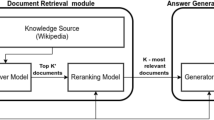Abstract
The manual correction for short answer questions is a tedious and time consuming task. This issue leads to the importance of having automatic correction systems for short answer questions. Thus this paper proposes three different approaches for correcting short answer questions. One of them is NLP-based while the others are machine learning based approaches. The three approaches are tested and compared across another two short answer correction systems that are evaluated on the same dataset. Results show that the proposed approaches outperform others that are evaluated on the same dataset.
Access this chapter
Tax calculation will be finalised at checkout
Purchases are for personal use only
Similar content being viewed by others
Notes
- 1.
- 2.
Available at: http://research.microsoft.com/msrsplat
- 3.
Smatch: amr.isi.edu/evaluation.html
- 4.
References
Mohler, F., Mihalcea, R.: Text-to-text semantic similarity for automatic short answer grading. In: Proceedings of the 12th Conference of the European Chapter of the ACL, Association for Computational Linguistics, Athens, Greece, pp. 567–575 (2009)
Siddiqi, R.: Impact of Automated short-answer marking on students’ learning: IndusMarker, a case study. In: International Conference on Information & Communication Technologies (2013)
Gomaa, W.H., Fahmy, A.A.: Automatic Arabic Essay Assessment. Ph.D. thesis, Faculty of Computer Science, Cairo University (2014)
Leacock, C., Chodorow, M.: C-rater: automated scoring of short-answer questions. Comput. Humanit. 37 (2003)
Goodfellow, I., Bengio, Y., Courville, A.: Deep Learning. MIT Press, New York (2016)
W. Gomaa, W., Fahmy, A.: Short answer grading using string similarity and corpus-based similarity. Int. J. Adv. Comput. Sci. Appl. (2012)
Cai, S., Knight, K.: Smatch: an evaluation metric for semantic feature structures. In: Proceedings of the 51st Annual Meeting of the Association for Computational Linguistics, pp. 748–752 (2013)
Vanderwende, A., Menezes, A., Quirk, V.: An AMR parser for English, French, German, Spanish and Japanese and a new AMR-annotated corpus. In: Microsoft Research, Proceedings of NAACL-HLT 2015, pp. 26–30 (2015)
Bahdanau, D., Cho, K., Bengio, Y.: Neural machine translation by jointly learning to align and translate. arXiv preprint arXiv:1409.0473 (2014)
Du, K.L., Swamy, M.N.S.: Neural Networks and Statistical Learning. Chap. 11, Canada, pp. 351–363 (2013)
Mueller, J., Thyagarajan, A.: Siamese Recurrent architectures for learning sentence similarity. In: Proceedings of the Thirtieth AAAI Conference on Artificial Intelligence (2016)
Attia, Z.E., Arafa, W., Gheith, M.: An automatic short answer correction system based on the course material. Int. J. Intell. Eng. Syst. 11(3) (2018)
Hu, B., Lu, Z., Li, H., Chen, Q.: Convolutional neural network architectures for matching natural language sentences. In: NIPS (2014)
Yang, Z., Yang, D., Dyer, C., He, X., Smola, A., Hovy, E.: Hierarchical attention networks for document classification. In: Proceedings of the North American Chapter of the Association for Computational Linguistics: Human Language Technologies, pp. 1480–1489 (2016)
Hochreiter, S., Schmidhuber, J.: Long short-term memory. Neural Comput. 9(8), 1735–1780 (1997)
Flanigan, J., Thomson, S., Carbonell, J., Dyer, C., Smith, N.A.: A discriminative graph-based parser for the abstract meaning representation. In Proceedings of the 52nd Annual Meeting of the Association for Computational Linguistics, pp. 1426–1436 (2014)
Salehinejad, H., Sankar, S., Barfett, J., Colak, E., Valaee, S.: Recent Advances in Recurrent Neural Networks. arXiv:1801.01078 (2018)
Author information
Authors and Affiliations
Corresponding author
Editor information
Editors and Affiliations
Rights and permissions
Copyright information
© 2020 Springer Nature Switzerland AG
About this paper
Cite this paper
Attia, Z.E., Arafa, W., Gheith, M. (2020). Toward the Automatic Correction of Short Answer Questions. In: Hassanien, A., Shaalan, K., Tolba, M. (eds) Proceedings of the International Conference on Advanced Intelligent Systems and Informatics 2019. AISI 2019. Advances in Intelligent Systems and Computing, vol 1058. Springer, Cham. https://doi.org/10.1007/978-3-030-31129-2_42
Download citation
DOI: https://doi.org/10.1007/978-3-030-31129-2_42
Published:
Publisher Name: Springer, Cham
Print ISBN: 978-3-030-31128-5
Online ISBN: 978-3-030-31129-2
eBook Packages: Intelligent Technologies and RoboticsIntelligent Technologies and Robotics (R0)




